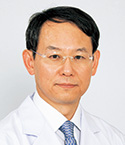Department of Hematology and Oncology
Overview of the department

Chairman
Prof. Yamauchi Takahiro
Consultation system/therapeutic strategies
At the outpatient clinic, all instructors provide daily medical services based on a day fixation system, and manage referrals from other hospitals. There are 30 to 40 patients on the ward at all times. One patient is attended by several physicians, consisting of an instructor, graduate students/medical staff, and residents. The professor (director of the department) joins the rounds once a week. Physicians, pharmacists, and laboratory technicians participate in conferences to review diagnoses and therapeutic strategies for individual patients. Basic theory- and evidence-based rational medical care is performed, with the philosophy of “Let’s cure cancer using drugs”. In addition, we are positively conducting clinical research by sponsoring the Hokuriku Hematology Oncology Study Group and participating in nationwide clinical studies (Japan Adult Leukemia Study Group, Malignant Lymphoma Study Group of the Japan Clinical Oncology Group). Furthermore, advanced medical care is performed, as described below.
Field of expertise
Chemotherapy for hematological cancer is primarily performed. In particular, we specialize in the treatment of leukemia, which requires the most potent chemotherapy.
For example, a neutrophil count of 0 persists for 2 weeks during treatment in patients with acute myelocytic leukemia. During this period, it is necessary to minimize the risk of death due to treatment-related toxicity through treatment in a bio clean room.
Physicians belonging to our department are skilled in such chemotherapy. They are also experienced in molecular-targeting therapy, which has recently been emphasized. In addition, most members are board-certified hematologists, specializing in blood diseases. Gout and hyperuricemia also comprise a common specialized field from the viewpoint of nucleic acid metabolism. There are only a few specialized institutes for this field in Japan.
Advanced medical care
Molecular-targeting therapy
It refers to therapy with drugs targeting specific, abnormal genes/molecules that exist in tumor cells alone. This therapy is effective, and the incidence of adverse reactions is low.
Representative drugs are imatinib for chronic myeloid leukemia and rituximab for malignant lymphoma.
High-dose chemotherapy with anticancer drugs
To treat leukemia or malignant lymphoma, high-dose chemotherapy with cytarabine or methotrexate at a dose 5 to 10 times higher than the standard is required in some cases.
In our department, specializing in chemotherapy, it can be performed safely.
Hematopoietic stem cell transplantation therapy
To treat malignant lymphoma or multiple myeloma, autologous peripheral blood stem cell transplantation therapy is conducted. To treat acute leukemia, allogeneic bone marrow transplantation is performed when there is an HLA-matched sibling.
Advanced chemotherapy with unapproved or investigational drugs
Anticancer drugs that are not covered by health insurance in Japan despite approval in Europe and the United States, as well as new drugs under clinical trials, are used based on patients’ wishes after the protocol is approved by the Institutional Review Board and Ethics Review Board of our hospital.
Diseases treated in our department
Malignant tumors of hematopoietic organs, such as acute myeloid leukemia, acute lymphoblastic leukemia, chronic myeloid leukemia, chronic lymphocytic leukemia, myelodysplastic syndromes, malignant lymphoma, multiple myeloma, polycythemia vera, essential thrombocythemia, and myelofibrosis.
All blood diseases, such as iron-deficiency anemia, pernicious anemia, hemolytic anemia, aplastic anemia, paroxysmal nocturnal hemoglobinuria, hereditary spherocytosis, idiopathic thrombocytopenic purpura, thrombotic thrombocytopenic purpura, disseminated intravascular coagulation, and hemophilia.
In addition, specialized chemotherapy for solid tumors is performed. Furthermore, specialized treatment for gout/hyperuricemia is conducted
Primary examinations and explanations
Blood test
Initially, blood is collected to test for blood diseases.
Bone marrow puncture/biopsy
The bone marrow is not only a site of hematopoiesis but also where the number of leukemia cells increases. Bone marrow tests are the most important. Using blood/bone marrow samples, cell surface antigens (by flow cytometry) and abnormal cancer-specific genes and chromosones are analyzed. The results of analysis are utilized to make a diagnosis, evaluate the treatment response and the prognosis, and continue follow-up.
Imaging procedures
The general condition is evaluated using CT, MRI, and FDG-PET. In particular, these examinations are important to evaluate the stage in patients with malignant lymphoma.
Bioclean room
There are 17 bioclean rooms in single bioclean zone of the new hospital ward . They are used to safely perform chemotherapy for leukemia and transplantation therapy.
 University of Fukui Hospital
University of Fukui Hospital University of Fukui Hospital
University of Fukui Hospital +81-776-61-311
+81-776-61-311 Access
Access